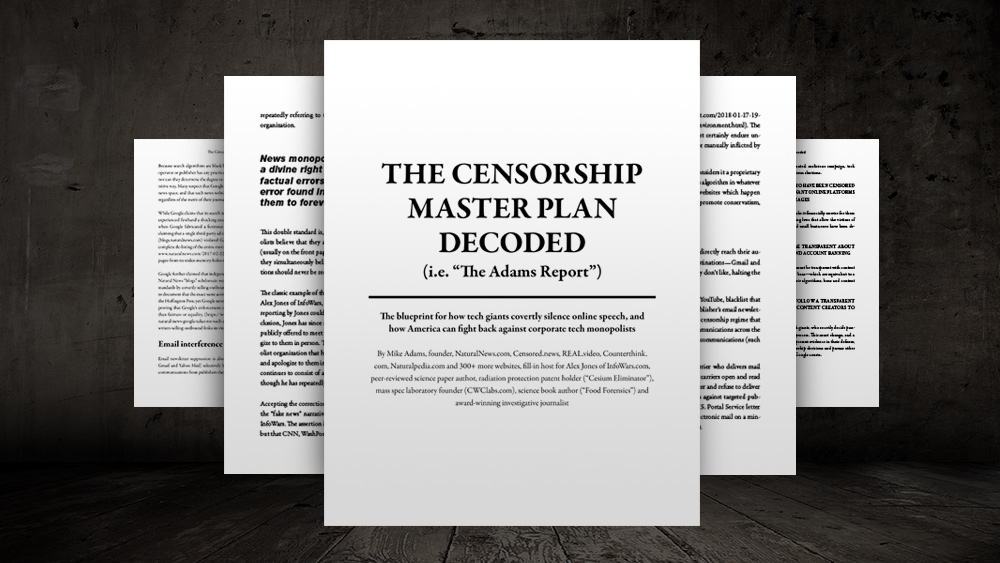Technological and Psychological Methods of Overt and Covert Censorship
07/17/2018 / By Mike Adams

This is a partial reprinting of “The Censorship Master Plan Decoded,” available at this link (PDF).
The Censorship Master Plan Decoded (i.e. “The Adams Report”)
The blueprint for how tech giants covertly silence online speech, and how America can fight back against corporate tech monopolists
Censorship of targeted websites is achieved not only through technical (mechanical) means, but also through the coordinated application of psychological weapons which intend to create doubt and mistrust toward targeted websites / publishers.
Technical methods of censoring targeted independent news outlets
While other methods exist, the primary technical methods with the most destructive impact are:
• Demonetization
• Shadow banning
• Deplatforming
• Black box search algorithms
• Email interference
Demonetization
Internet gatekeepers don’t stop at merely banning, shadow banning or blocking accounts; they also engage in a kind of economic warfare known as “demonetization.”
This form of economic warfare against independent media publishers is widely practiced by Google and Facebook by cutting off publishers from customary revenue sources (advertising) which are simultaneously kept in place for “agreeable” news publishers (i.e. left-wing content publishers).
Demonetization, which began in earnest following the 2016 President election, has been devastating to the vast majority of independent publishers, with revenues falling 90% among many. The policy of demonetization was accelerated following the faux outrage campaign organized by the now-discredited Southern Poverty Law Center (SPLC), which organized grassroots efforts to attack advertisers whose ads appeared adjacent to content from conservative publishers. This engineered campaign coalesced into intense pressure inside Google and Facebook to block all advertising from appearing on channels offering conservative or pro-Trump content.
Because of Google’s dominant influence in the online advertising marketplace, Google is also able to influence second-tier advertising firms and ad “remarketing” companies to ban ads from certain publishers or individuals. The InfoWars Store, for example, was banned from third-party remarketing advertising due to pressure from Google, and this took place even though the InfoWars Store sells nutritional products, air filters and home living products which are equivalently sold by Amazon, Whole Foods and many other companies. Notably, the ban against InfoWars Store remarketing was justified based entirely on the news content of the InfoWars platform, not any problem with InfoWars Store products.
This means that online advertising giants — and their second-tier advertising partners — are now censoring e-commerce based entirely on their personal dislike for the speech content originating from a news brand that’s related to the e-commerce platform. In the real world, this would be equivalent to a TV station banning ads from a car dealer because the owner of that dealer gave a history speech to high school students, honoring the Founding Fathers of America.
“Demonetization” essentially means that if an ad-powered platform doesn’t like your speech, they will actively prevent you from using their services even if the products and services your are offering are broadly represented by other companies who also use their ad services.
Such forms of censorship may violate federal law’s protections of the right to engage in commerce without interference.
Shadow banning
Shadow banning, discussed in some detail earlier, is a deceptive censorship tactic that gives the originator of content the false impression that their content was distributed to their full base of followers. In reality, the content is secretly banned for most users, and delivery only takes place to a tiny fraction of the followers who normally expect to receive such information.
Facebook is infamous for shadow banning selected publishers it does not like. Natural News, for example, has over two million followers, but a typical post will only be allowed to reach a few hundred followers (greater than 99.9% shadow ban rate).
Outright banning / Deplatforming
Outright banning means “deplatforming” a publisher or individual. This is a full banning of their account. Notably, CNN, which has experienced a large drop of its U.S. audience since the 2016 election, is aggressively lobbying Facebook to deplatform Infowars. CNN apparently sees no conflict of interest in such a demand, even though InfoWars is a clear competitor in the news space in which CNN pretends to operate.
Black box search results algorithm tweaking
Search engines and search engine components (such as the on-site search on YouTube) may achieve additional selective censorship of political targets by engaging in “black box algorithmic” banning via search results. When users enter a search term, particular websites or channels which are not liked by Google, Facebook, Twitter, etc., may be selectively and secretly penalized in the algorithm, ensuring that they are artificially moved down the list of search results to the point of being nearly invisible.
Because search algorithms are black box affairs with zero public transparency, no website operator or publisher has any practical way to know whether they are being “black boxed,” nor can they determine the degree to which such bias is being leveled against them in a punitive way. Many suspect that Google maintains a list of specific domains to penalize in the news space, and that such news websites are heavily penalized in all Google search results, regardless of the merit of their journalistic reporting.
While Google claims that its search results are driven entirely by algorithms, Natural News experienced firsthand a shocking example of being wholly blacklisted by Google in 2017, when Google fabricated a fictitious justification for banning the entire website, falsely claiming that a single third-party ad on one blogger-written article hosted on a subdomain (blogs.naturalnews.com) violated Google’s terms of service and therefore justified the complete de-listing of the entire root domain and all pages (over 140,000 pages). (https://www.naturalnews.com/2017-02-22-google-blacklists-natural-news-removes-140000-pages-from-its-index-memory-holes-natural-news-investigative-articles.html)
Google further claimed that independent bloggers who independently contributed to the Natural News “blogs” subdomain were, in some cases, violating Natural News journalistic standards by covertly selling outbound links to publicity seekers. Natural News was able to document that the exact same activity was taking place on BuzzFeed, Forbes, CNN and the Huffington Post, yet Google never outright banned or penalized any of those websites, proving that Google’s enforcement of its own policies is rooted in subjective bias rather than fairness or equality. (https://www.naturalnews.com/2017-02-25-after-blacklisting-natural-news-google-takes-no-such-action-against-huffpo-buzzfeed-forbes-and-cnn-for-writers-selling-outbound-links-in-violation-of-webmaster-guidelines.html)
Email interference
Email newsletter suppression is also discussed above. It consists of email ISPs (namely Gmail and Yahoo Mail) selectively blocking the delivery of email newsletters and other communications from publishers they don’t like.
In a tech-driven society, this is akin to stealing and destroying the postal mail of your neighbors merely because you hate their politics, yet Google and Yahoo pursue these malicious actions on a daily basis, without any apparent repercussions.
Outsourcing censorship
In order to achieve aggressive censorship goals without implementing such censorship via internal policies, nearly all tech giants outsource their censorship to third-party organizations, almost all of which have their own history of errors and extreme bias. The primary organizations currently employed as “censorship outsourcing” centers are:
• Southern Poverty Law Center (SPLC), a radical left-wing activism group that routinely labels Christian and Bible groups “hate groups.”
• SNOPES, a widely discredited “fact-checking” organization run by extreme left-wing activists who appear to care more about political influence than credible facts.
• Politifact, similar to SNOPES in terms of its lack of credibility but far more organized and well-funded. Politifact renders the majority of its decisions in favor of Democrats and has been repeatedly caught applying self-contradictory “rules” in a highly subjective way, depending on which political party might benefit from any given decision.
• Wikipedia, an anonymous “trolling” encyclopedia run by a multitude of tribal trolls, each with their own political or corporate agenda. Wikipedia, notably, has zero accountability and no pragmatic quality control process whatsoever, yet Google and other search engines almost universally cite Wikipedia as a credible source on nearly everything.
By outsourcing censorship tasks to radical left-wing organizations, tech giants like YouTube and Facebook can legitimately claim they aren’t censoring anyone for political speech. It’s the third-party groups that are doing it with the consent of YouTube, you see.
This report reprint continues at this article link (pending).
Find the full report at this link (PDF).
See the video presentation of this report by Mike Adams at the following Brighteon.com link:
https://www.brighteon.com/channel/realvideo
Tagged Under: Censorship, deplatforming, discrimination, Facebook, First Amendment, free speech, freedom, Google, Liberty, Mike Adams, monopolies, shadow ban, society, tech giants, Twitter, YouTube
RECENT NEWS & ARTICLES
COPYRIGHT © 2017 COMPUTING NEWS




















